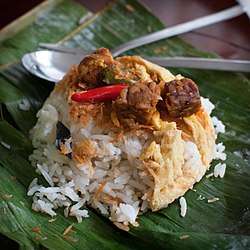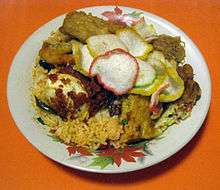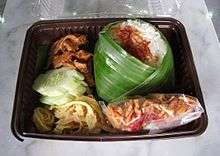Nasi uduk
Nasi uduk is an Indonesian Betawi style steamed rice cooked in coconut milk dish, originally from Jakarta,[1] that can be widely found across the country.
 A basic nasi uduk from a shop in the Netherlands | |
| Course | Main course |
|---|---|
| Place of origin | Indonesia[1] |
| Region or state | Jakarta, Nationwide |
| Serving temperature | Hot or room temperature |
| Main ingredients | Rice cooked in coconut milk with side dishes |
Etymology
Nasi uduk literally means "mixed rice" in Betawi dialect, related with Indonesian term aduk ("mix"). The name describes the dish preparation itself which requires more ingredients (coconut milk, clove, lemongrass, cinnamon, and pandan leaf) than cooking common steamed rice and additional side dishes.[2]
Preparation
Nasi uduk is made by cooking rice soaked in coconut milk instead of water, along with clove, cassia bark, and lemongrass to add aroma. Sometimes knotted pandan leaves are thrown into the rice while steaming to give it more fragrance. The coconut milk and spices imparts an oily, rich taste to the rice. Bawang goreng (fried shallots) is sprinkled on top of the rice before serving. Other dishes are usually served as side dishes. Pre-packed nasi uduk are commonly wrapped in a cone-shaped banana leaf.[3]
Side dishes


Nasi uduk sold in warung or other eating establishments are commonly offered with assortment of side dishes, chosen by the client. The pre-packed basic nasi uduk usually consists of tempe orek (tempeh stir fried with sweet soy sauce), teri kacang (anchovy with peanuts), and shredded omelette, with sambal kacang (peanut sambal).
Side dishes offered with nasi uduk are:
- Tempe orek (tempeh stir fried with vegetables and soy sauce)
- Eggs such as ceplok (fried egg), omelette, shredded omelette, telur balado (hard boiled egg in sambal sauce), and telur pindang
- Teri kacang (anchovy with peanuts)
- Bihun goreng (fried rice vermicelli)
- Tumis buncis (stir fried common beans)
- Krechek (beef rind (similar to pork rind) in spicy coconut milk)
- Ayam goreng (fried chicken)[4]
- Jeroan (offals, including tripe, cow lungs, liver and gizzards)[4]
- Empal (fried beef)
- Semur daging (beef stew in sweet soy sauce)
- Semur tahu (tofu stew in sweet soy sauce)
- Semur jengkol (jengkol bean stew in sweet soy sauce)
- Gorengan (fritters) such as fried tempeh, tofu, or bakwan (chopped vegetable fritters), perkedel kentang (potato patties) or perkedel jagung (corn fritter)
- Emping (melinjo chips or krupuk bawang (onion cracker))
The most common type of sambal that usually served with nasi uduk is sambal kacang (peanut sambal); it is optional as a condiment.
Popularity
Nasi uduk is a popular dish for the busy commuters in Jakarta, mainly because it is affordable (one serving costs on average Rp10,000 or about US$0.77). It can be found throughout the day; some roadside stalls open exclusively in the morning, noon, or night, depending on the demographics of the surrounding area. Stalls near residential areas, marketplaces, train stations, and schools are usually open from morning to noon, while the ones near offices and street-side are usually open afternoon to midnight.[4]
Variants
Each neighbourhood in Jakarta has its own variant of the dish, the most notable being Nasi uduk Slipi from West Jakarta.[1] Kebon Kacang area near Tanah Abang in Central Jakarta is renowned for its nasi uduk.[4]
The dish is known as berkat (literally: "blessing") in Suriname. There are similar dishes in Riau and Riau islands (Sumatera), Malaysia, Brunei, Singapore and Southern Thailand called nasi lemak. Another slightly different dish is nasi ulam.
See also
References
- Maria Endah Hulupi (June 22, 2003). "Betawi cuisine, a culinary journey through history". The Jakarta Post. Retrieved August 18, 2014.
- "Where to Eat in Cikini: Nasi Uduk Gondangdia". Jakarta by Train. 11 December 2014.
- "Nasi Uduk Sederhana Babe H. Saman: Legendary Nasi Uduk in Tanah Abang". Jakarta by Train. 1 December 2013.
- "The best nasi uduk in Kebon Kacang". Jakarta Post. 27 December 2016.
External links
| Wikimedia Commons has media related to Nasi uduk. |
